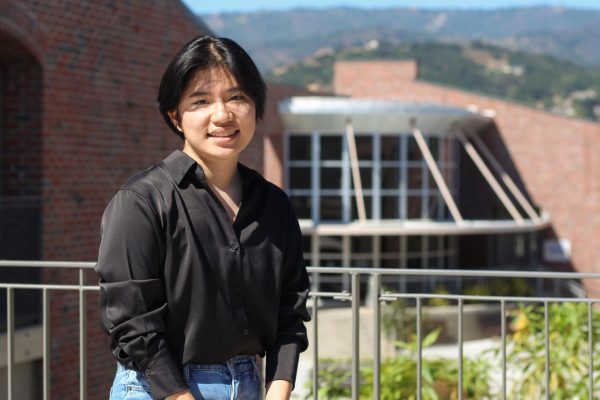Voicing my insecurities
Learning to stop disliking my own voice
June 2, 2023
I’ve always been so used to hearing my own voice, the intricacies and nuances in my inflection and how my laugh sounded, according to my friends, like a braying seal, that I never really thought about how I sounded to others. I guess I always assumed that others heard me the same way I heard myself, and I’d never had any reason to think otherwise. Then middle school rolled around, and I had to film a video for a class. It was the first time I’d heard my voice played back to me, as if I was talking to myself. And let me tell you: I was mortified.
My voice sounded nasally, higher even. And it had that sneering little up tone at the end of each phrase that I’d always associated with annoying know-it-alls in movies. If I wasn’t watching my own mouth move on the screen, I would have believed that this was a completely different person. I cringed with every piercing laugh and sank deeper into my seat as I wondered whether this was how the rest of the world saw me. By the end of the video, I felt ready to renounce my life and live out the rest of my time as a wizened old hermit in the mountains if it meant no one would have to ever hear my voice again.
It sounds so silly that something so simple could have had such a significant impact, but I truly felt like my world had tilted on its axis. People often tell me that their first impression of me was my voice rather than how I looked, and I was forced to look back and wonder whether those impressions were good or bad. I loathed how I sounded. I found myself reevaluating all the exchanges I’d had with my friends before, worried that I’d been perceived as irritating or a nuisance.
As a result, I became more conscious about how I spoke. Whenever I could, I actively tried to tamp down on the wild way I tended to speak — I talked quieter, laughed less and maintained a sense of calm to combat the frantic energy I heard when I listened to my voice recordings. There were times when I reverted to my previous tendencies, and when I realized afterward, I would wince and promise I’d watch myself next time. In the long run, I even began to talk less. Constantly worried about how I sounded and presented myself, at times, it just became easier to not speak at all.
Then I got to high school and joined El Estoque, and suddenly I was tossed into an environment where all the interviews I conducted were required to be recorded or filmed. Every time I would write or edit a story, I needed to listen to the interview over and over. It was a trying experience at first. While I was listening to the recordings, I’d move the slider of the audio to right after the questions I asked in order to avoid hearing my own voice.
But as time went on, I got tired of trying to find that specific moment I stopped talking, and I started to listen to the tail end of the questions I asked. That tail end grew into half the question, then the entire question and finally made its way to the whole interview. And as the time I spent listening to my own voice grew, the more comfortable I became hearing it. I still didn’t like it, but it didn’t make me want to crawl into a hole and pass out like before. There wasn’t any sudden moment of enlightenment, but a couple of weeks ago, as I listened through the audio of a video story I had filmed, I found that I wasn’t repulsed by my own voice anymore. It was as if through some sort of gradual exposure therapy, my voice had become tolerable.
I’ll be honest, I still don’t love my voice. I still prefer performing live for presentations as opposed to filming them. I still think I sound like the slightly more annoying, louder version of Mickey Mouse. But I’ve learned to live with that. Because at least now, I don’t spend as much time playing back the tone in which I spoke, or regretting the fact that I laughed too loudly that one time my friend made a bad dad joke. So yes, I may not have figured everything out, and that’s OK. Learning to accept my insecurities is a learning process, and I have no doubt that as life continues, I’ll also continue to become more accepting of how I sound.
















